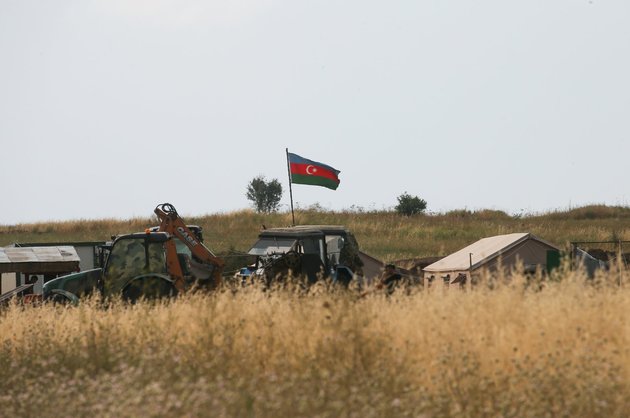Azerbaijan, Armenia and Russia signed a cease-fire agreement on Nov. 9, 2020, that has shaped the region in light of new realities and stronger Turkish involvement in the region as an important ally of Azerbaijan. Signing this document, Yerevan accepted Azerbaijan's terms, but as time progresses, the implementation of the document has become difficult for several reasons, Daily Sabah writes.
Turkey has clearly shown an interest in being an effective player in the postwar South Caucasus. Ankara supported Azerbaijan in the war and it is no secret that Turkish-made drones played an important role in Azerbaijan's victory. Ankara wants to increase its influence in the region in the postwar period and to guarantee a safe route to Central Asia via Azerbaijan. Ankara actively seeks to expand its soft power tools through the South Caucasus to Central Asia and be an active player in the future of this wide region.
During the war, the efforts from France, and later the U.S., have shown that global actors try to balance Russian hegemony in the region. U.S. President Joe Biden's administration especially tries to be more active in the region as a part of a new U.S. foreign policy strategy. In this environment, issues related with achieving permanent peace become more intricate.
A document for change
In fact, the November declaration has changed the geopolitical map of the region because, with this statement, Yerevan and Baku agreed to open transport links and regional economic integration. According to the document, Russia has become a key state guaranteeing peace and a cease-fire in the region, and Russian peacekeepers have been deployed along the line of contact in Nagorno-Karabakh, including the Lachin corridor. A Turkish-Russian joint monitoring center was also established in Aghdam. The center monitors the observance of the cease-fire between Armenia and Azerbaijan, but most importantly, it also provides the presence of Turkey in the region. Thus, two regional powers – Turkey and Russia – have strengthened their positions in the South Caucasus, ensuring their diplomatic and military presence.
The cease-fire was broken several times both at state borders of Azerbaijan and Armenia, as well as some incidents that happened in the Azerbaijani regions that are under the control of Russian peacekeepers. The remnants of Armenian military units have not been withdrawn from the territories of Azerbaijan that are under the control of Russian peacekeepers.
What worsens the situation?
The activities of Iran create dissatisfaction in Azerbaijan, although both countries have expressed interest in having a friendly relationship. As a result, the Iranian ambassador to Baku was invited to the Azerbaijani Foreign Ministry and a note verbale was submitted to the ambassador expressing discomfort over the recent arrival of Iranian vehicles to Azerbaijani territories being overseen by Russian peacekeepers. The Azerbaijani side again expressed that the redeployment of the Armenian military would threaten the peace in the region. Another threat to peace is the harsh rhetoric of newly appointed Armenian Defense Minister Arshak Karapetyan that has shown the postwar period will not be smooth and peace will not be provided in the short term.
In turn, Azerbaijan continues its cooperation with Israel in the military sphere, aims to have $2 billion worth of military deals with Israel and further strengthens its military ties with Turkey and Pakistan.
Turkish-Russian cooperation
Both Ankara and Moscow support regional economic integration by opening transport corridors in the region. In this sense, the Zangezur corridor is a very important transport route. All parties involved in this project will benefit from it. With the opening of the Zangezur corridor, the Nakhchivan Autonomous Republic will be directly connected with Azerbaijan, and Turkey also will have an opportunity for direct connection with other Turkic-speaking countries in Central Asia. Armenia will have access to transport connections with Iran via Nakhchivan and with Russia through northwest Azerbaijan. Furthermore, a new platform proposed by Azerbaijan and Turkey that would involve Russia, Iran, Georgia and Armenia, could propel peace and development in the region.
Taking into consideration the issues mentioned above, the region's problems are not expected to be solved in a short time. However, it is essential that both governments and nations understand that a rationalist and constructivist approach is the main element needed to bring peace and development to the region.






